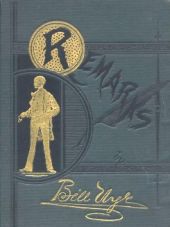Remarks
by Bill Nye

George III was born in England June 4, 1738, and ran for king in 1760. He was a son of Frederick, Prince of Wales, and held the office of king for sixty years. He was a natural born king and succeeded his grandfather, George II. Look as you will a-down the long page of English history, and you will not fail to notice the scarcity of self-made kings. How few of them were poor boys and had to skin along for years with no money, no influential friends and no fun.
Ah, little does the English king know of hard times and carrying two or three barrels of water to a tired elephant in order that he may get into the afternoon performance without money. When he gets tired of being prince, all he has to do is just to be king all day at good wages, and then at night take off his high-priced crown, hang it up on the hat-rack, put on a soft hat and take in the town.
George III quit being prince at the age of 22 years, and began to hold down the English throne. He would reign along for a few years, taking it kind of quiet, and then all at once he would declare war and pick out some people to go abroad and leave their skeletons on some foreign shore. That was George’s favorite amusement. He got up the Spanish war in two years after he clome the throne; then he had an American revolution, a French revolution, an Irish rebellion and a Napoleonic war. He dearly loved carnage, if it could be prepared on a foreign strand. George always wanted imported carnage, even if it came higher. It was in 1765, and early in George’s reign, that the American stamp act passed the Legislature and the Goddess of Liberty began to kick over the dashboard.
George was different from most English kings, morally. When he spit on his hand and grasped the sceptre, he took his scruples with him right onto the throne. He was not talked about half so much as other kings before or since his time. Nine o’clock most always found George in bed, with his sceptre under the window-sash, so that he could get plenty of fresh air. As it got along toward 9 o’clock, he would call the hired girl, tell her to spread a linen lap-robe on the throne till morning, issue a royal ukase directing her to turn out the cat, and instructing the cook to set the pancake batter behind the royal stove in the council chamber, then he would wind the clock and retire. Early in the morning George would be up and dressed, have all his chores done and the throne dusted off ready for another hard day’s reign.
George III is the party referred to in the Declaration of Independence the present king of Great Britain, and of whom many bitter personal remarks were made by American patriots. On this side of the water George was not highly esteemed. If he had come over here to spend the summer with friends in Boston, during the days of the stamp act excitement, he could have gone home packed in ice, no doubt, and with a Swiss sunset under each eye.
George’s mind was always a little on the bias, and in 1810 he went crazy for the fifth time. Always before that he had gone right ahead with his reign, whether he was crazy or not, but with the fifth attack of insanity, coupled with suggestion of the brain and blind staggers, it was decided to tie him up in the barn and let someone else reign awhile. The historian says that blindness succeeded this attack, and in 1811 the Prince of Wales became regent.
George III died at Windsor in 1820, with the consent of a joint committee of both houses of congress, at the age of 82 years. He made the longest run as king, without stopping for feed or water, of any monarch in English history. Sixty years is a long time to be a monarch and look under the bed every night for a Nihilist loaded with a cut-glass bomb and Paris green. Sixty years is a long while to jerk a sceptre over a nation and keep on the right side, politically, all the time.
George was of an inventive turn of mind, and used to be monkeying with some kind of a patent, evenings, after he had peeled his royal robes. Most of his patents related to land, however, and some of the most successful soil in Massachusetts was patented by George.
He was always trying some scheme to make a pile of money easy, so that he wouldn’t have to work; but he died poor and crazy at last, in England. He was not very smart, but he attended to business all the time, and did not get up much of a reputation as a moral leper. He said that as king of Great Britain and general superintendent of Cork he did not aim to make much noise, but he desired to attract universal attention by being so moral that he would be regarded as eccentric by other crowned heads.
 Continue...
Continue...![[Buy at Amazon]](../images.amazon.com/images/P/B000875S1G.01.MZZZZZZZ.gif)